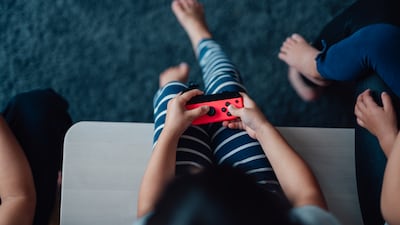From disintegrating social skills to aggressive tantrums and failing eyesight, gaming addiction in children is having a devastating impact on family dynamics.
Child development experts responded to a recent social media message by the Ministry of Health and Prevention, identifying warning signs of early gaming addiction and how parents can seek support.
Obsessing about games and losing interest in other activities were clear warning signs, as more young people have access to technology that ever.
Last year, the American Academy of Paediatrics (AAP) said more than 90 per cent of children older than two now play video games, with three quarters of US households owning a gaming console.
Despite these numbers, the long-term impact of tech addiction and gaming disorders in children is not yet fully understood.
The Unplugged Initiative is an Abu Dhabi-based educational organisation offering programmes to deal with screen addiction and promote digital wellness in under-eights.
Anisa Ismail, an early-years child development professional and founder of the campaign, said recent examples had exposed the effect gaming can have on young people.
“Sadly, the problems here are way higher than elsewhere in the world because the circumstances here are different,” Ms Ismail said.
“We have a higher number of expat families away from home countries, so a lot of children from those backgrounds have devices as a tool to connect with other children.
“Since Covid, the number of children with access to devices has increased.
“Parents and clients often have no idea how to introduce devices or set boundaries, so their children develop an unhealthy relationship. We create programmes to combat this.”
Gaming obsession
Twin brothers Zayed and Theyab, seven, have been given help by Unplugged after following their father’s passion for gaming and a strong connection with the Super Mario Brothers games developed for Nintendo consoles.
During the pandemic, screen time increased and has since proved a difficult habit to break.
After being given Roblox – a virtual world of dozens of user-generated games – to play during the winter break, the boys have become "gaming zombies" with few interests in the real world.
“They woke early in the morning and played until late evening, not wanting to do anything else,” Ms Ismail said.
“They had become Roblox zombies and it alarmed their parents, who immediately removed the game. It was as if once the games sunk into their world, they quickly took over.”
Mohamed, five, was another who became obsessed after being given an iPad to play on by an older brother and spending at least five hours a day consumed by the games at weekends.
“Any time anyone would try to take it away, he would break into a fit and become wildly aggressive,” said Ms Ismail.
“Bargaining was the only way anyone could get through to him. He hated going to school in the morning and would be running through the door straight to his gaming console the minute he walked back in the house.
“Nothing could come between him and his games. His parents were stressed and worried it was getting far too much.”
According to the AAP, children aged eight-17 spend a daily average of 1.5 to two hours playing video games.
While play is an essential component of healthy child development, taking it into a virtual world is having an adverse effect on social skills.

Time limits
Unplugged recommends children two and under should have no more than 15 minutes screen time a day because of their developing brains.
When they are three to five, it should be about 30 to 45 minutes a day, but only early in the morning.
Device-free rooms and allotted times for gaming are other methods used to help wean children off the screen in the hope of restoring family connections.
“The word 'addiction' used to be associated with substance abuse but now it includes other problematic behaviour, such as gaming and electronic addiction,” said Dr Simy Mathew, a specialist in paediatrics at Canadian Specialist Hospital, Dubai.
“Technology addiction is a behavioural problem caused by the excessive interaction of humans with machines.
“Some of the problems children face due to this media addiction – especially gaming – are psychological problems.
“They can cause mental health issues, such as depression and anxiety, and also reduce self-confidence, life-satisfaction and emotional stability.”
It is not only social skills that suffer during an unhealthy relationship with gaming and technology.
Healthy eyesight is also at risk, particularly during the sensitive years of childhood and rapid growth.
Dr Julia Sempere Matarredona, an ophthalmologist at the Barraquer Eye Hospital in Dubai, warned screens have an addictive effect on children that is not recommended for healthy cognitive development.
“We should be increasingly aware screens can affect the visual health of our little ones and it is our obligation to proactively take care of their vision from childhood,” she said.
“Concern about excessive exposure to digital screens in childhood has been increasing, especially after the pandemic.
“Blue light is part of the visible light spectrum. Whereas sunlight is the biggest source of blue light, electronic devices such as tablets, smartphones, computer monitors or LED TVs are a source of artificial blue light.
“The current concern is about long-term effects of screen exposure in children.”
Health guidelines involve resting the eyes every 20 minutes.
A simple "20-20-20 rule" is that for every 20 minutes spent near a screen, children should take a 20-second break and look 20 feet (more than 6 metres) into the distance, said Dr Matarredona.
"Screen exposure should be avoided altogether at least an hour before going to sleep,” she said.

